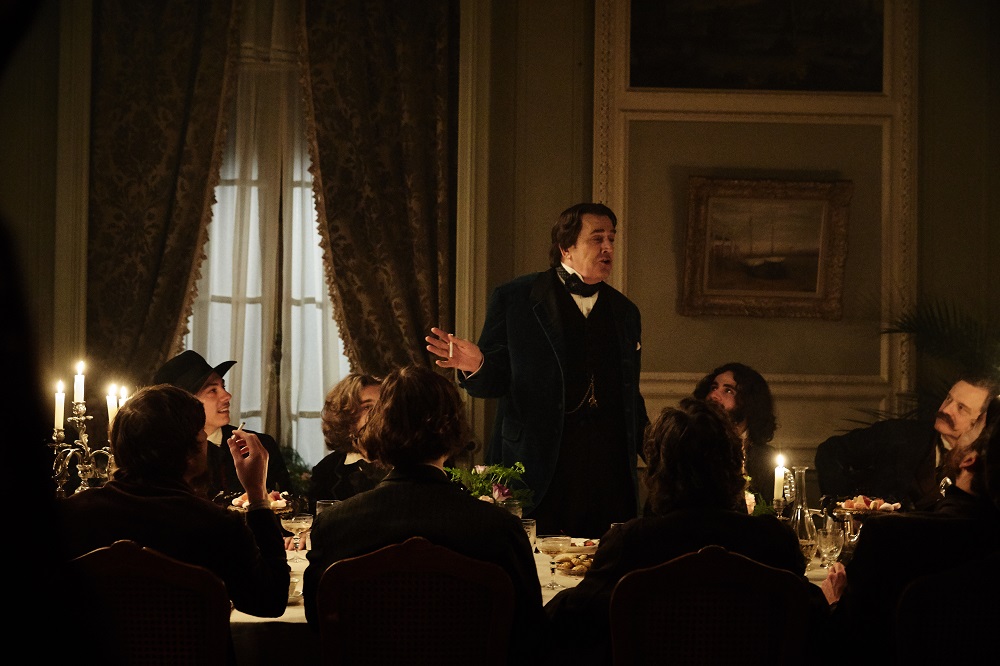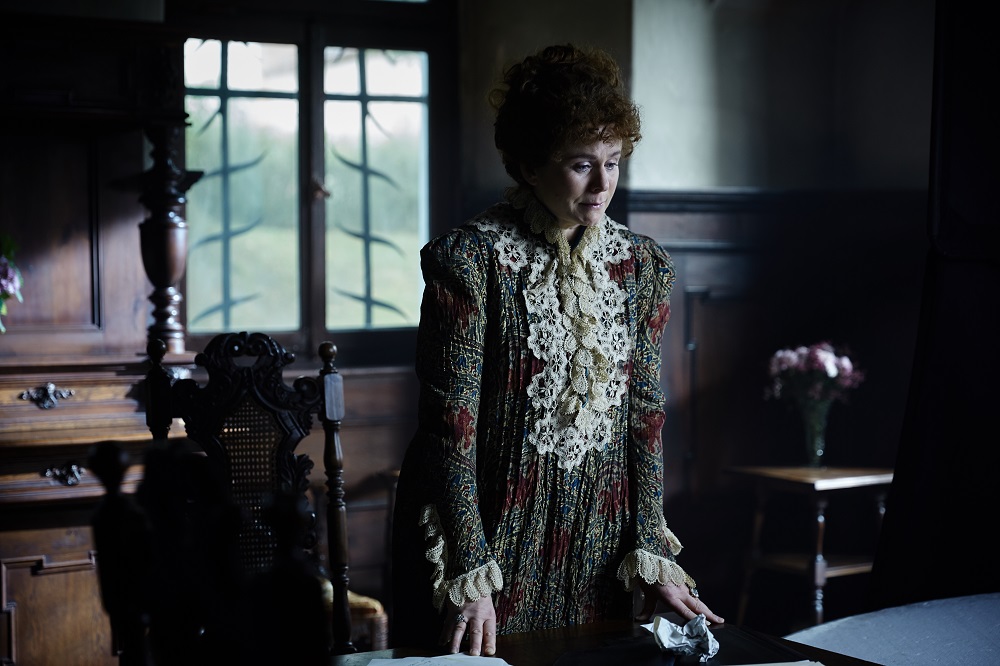It was only a year ago that Nick Broomfield’s Whitney: Why Can’t I Be Me was released. Kevin Macdonald’s new documentary about the rise and hideous demise of one of pop’s greatest stars was made with the blessing of her family, but doesn’t shed significantly more light than the Broomfield version. In fact a couple of Broomfield’s interviewees who don’t appear here were more illuminating than some who do.

There’s undoubtedly a memorable film to be crafted from the life of guitar legend and grand old survivor Eric Clapton – for instance, Melvyn Bragg made a very good South Bank Show about him in 1987 – but the longer this one goes on, the less it has to say. Nor is it obvious why it has been made now.

"All this fuss over a bookstore?!" That's likely to be a common reaction to Spanish director Isabel Coixet's The Bookshop, which adapts a slender if much-admired 1978 novel by the quintessentially English Penelope Fitzgerald in order to cock a Continental snook at her English compatriots' mean-spirited ways.

There is something irresistibly haunting about tales of epic sea voyages and the perils they entail. Recently we’ve had two versions of the tragic saga of lone yachtsman Donald Crowhurst (not to mention the excellent documentary Deep Water from 2006), and you could lob into the mix the Robert Redford vehicle All Is Lost, Kon-Tiki, White Squall and… er… many more.

The issue of immigrants being smuggled across the Mexican border into the USA is currently live and inflammatory, and this second instalment of the feds-versus-drugs cartels saga hurls us right into the centre of it.

The dad who lives off-grid with his offspring is becoming a regular visitor to cinema screens. He was last seen in the guise of Viggo Mortensen in Captain Fantastic, the story of the father whose seven-strong brood must learn to come out of the forest and live in society. The latest telling is Leave No Trace, in which a military veteran Will (Ben Foster, pictured below) and his 13-year-old daughter Tom (Thomasin McKenzie) have been camping, apparently for years, in the woods of a national park near Portland, Oregon.

The Cannes jury in 2017 gave best actress to Diane Kruger for her performance in In the Fade. She plays Katja, who turns avenging angel when her son and Turkish husband are murdered. It’s Kruger’s first acting role in her native German and she’s on screen for almost the entire film. Whether you are absorbed by the narrative of In the Fade (German title: Aus der Nichts) or find yourself distanced by the stylistic tics and plot holes, probably depends on how much Kruger/Katja convinces you. I kept being reminded of another intelligent, beautiful model turned actress, Jessica Lange, who took on a heavyweight role in Costa-Gavras' courtroom drama, The Music Box. If Kruger could have delivered a similarly nuanced performance, In the Fade might have overcome its somewhat clunky structure.
Director Fatih Akin, the son of Turkish immigrants, lives in Hamburg and has won high praise for previous films such as Head On (2004) and Soul Kitchen (2009) that captured multicultural life in Germany. Here he takes a darker turn, drawing on the recent rise of neo-Nazi terrorism to craft a thriller that turns into a courtroom drama and then an action-revenge movie. In the Fade won him a Golden Globe for best foreign film but has not done that well at the US box office before its release here, timed perhaps as an intelligent women’s film alternative to World Cup season.
We first meet Katja in home movie flashbacks. She’s a bohemian young student, buying drugs from Nuri (played by Numan Acar, best known from season 4 of Homeland). They fall in love and marry while he’s in prison. Cut to the present day and we meet a more respectable couple with a cute six-year-old son and a shared business. They’re running a travel and translation agency from a shop-front office in a Turkish neighbourhood in Hamburg. It’s not the most lucrative of enterprises and makes their very glossy home and top-end BMW a bit baffling. (Pictured below: Diane Kruger and Numan Acar) Turns out their lifestyle’s funded by Nuri’s father’s property empire back in Turkey, but it’s this kind of distracting detail that makes it hard to be absorbed by the main narrative. Instead of working as a device to show how prejudiced the investigating police are – they assume from his lifestyle that Nuri is still a drug-dealer and that his murderers will be from the underworld – the emphasis on luxe production design make it seem as if the filmmakers couldn’t resist floating camerawork around stylish interiors and fast cars, rather than working within the cramped confinement of a real apartment and an everyday motor.
Turns out their lifestyle’s funded by Nuri’s father’s property empire back in Turkey, but it’s this kind of distracting detail that makes it hard to be absorbed by the main narrative. Instead of working as a device to show how prejudiced the investigating police are – they assume from his lifestyle that Nuri is still a drug-dealer and that his murderers will be from the underworld – the emphasis on luxe production design make it seem as if the filmmakers couldn’t resist floating camerawork around stylish interiors and fast cars, rather than working within the cramped confinement of a real apartment and an everyday motor.
In the Fade was co-written by lawyer Hark Bohm and is partially based on a real-life terrorism case which is yet to be resolved. The courtroom scenes are screenwriting 101: the presentation of gruesome forensic detail, infuriating legal nitpicking and passionate emotional outbursts from Kruger. There’s a particularly ferocious performance by the cadaverous Johannes Krisch as the ruthless defence lawyer. It’s the final section of the film, when it turns into a vigilante revenge movie, which really puts too much burden on Kruger's acting skills and taxes the viewer’s ability to suspend disbelief. While it’s good to get an insight into Germany’s current racial tensions and the film is never boring, In the Fade just doesn’t quite deliver.
Overleaf: watch the trailer to In the Fade

Perfectly timed, in theory, for the advent of #MeToo and Hollywood’s post-Weinstein era, this girl-power redesign of the Ocean franchise has lined up a turbo-charged cast and then not given them anything very interesting to do.

Oscar Wilde did not have a dignified departure. As soon as he died, his body began to emit a river of fluids from various orifices. At the graveside in Père Lachaise there were unseemly scenes which no witness was indiscreet enough to describe, but probably they involved theatrics from Bosie. Wilde, using Canon Chasuble as a mouthpiece, had once joked about choosing to be interred in Paris: “I fear that hardly points to any very serious state of mind at the last.”
Rupert Everett’s The Happy Prince ponders that throwaway gag from a variety of angles. Despite his desperate plight, Everett’s Oscar is far from serious. In the brief years of his exile, we see him sing a bawdy gay song at the top of his voice in a French drinking den, dine with a rowdy coterie of Gallic poets (pictured below), and cavort with naked young Neapolitans in an all-male enactment of Salome. Anyone expecting this biopic to be an unremitting tale of misery and humiliation should prepare for a joyous surprise. Wilde was released from Reading Gaol in 1897 and immediately fled across the Channel, where there was still no escape from Anglo-Saxon opprobrium. Near the start, a well-to-do woman (a cameo for Anna Chancellor) recognises him in a street in northern France but is forbidden from expressing sympathy by her husband. They both roared in the stalls before the playwright’s downfall, but the English have their standards. Oscar’s strength and saviour are Reggie Turner (Colin Firth) and Robbie Ross (Edwin Thomas) whose love and tolerance is unstinting. But they urge him to stick to the terms of his agreement with his wife Constance (Emily Watson): in order to keep receiving his allowance, he must avoid contact with Lord Alfred Douglas (Colin Morgan).
Wilde was released from Reading Gaol in 1897 and immediately fled across the Channel, where there was still no escape from Anglo-Saxon opprobrium. Near the start, a well-to-do woman (a cameo for Anna Chancellor) recognises him in a street in northern France but is forbidden from expressing sympathy by her husband. They both roared in the stalls before the playwright’s downfall, but the English have their standards. Oscar’s strength and saviour are Reggie Turner (Colin Firth) and Robbie Ross (Edwin Thomas) whose love and tolerance is unstinting. But they urge him to stick to the terms of his agreement with his wife Constance (Emily Watson): in order to keep receiving his allowance, he must avoid contact with Lord Alfred Douglas (Colin Morgan).
Bosie was the cause of all the trouble in the first place. An opening caption reminds us that Wilde’s legal travails were triggered when the 9th Marquess of Queensberry, Lord Alfred’s father, left a card for Wilde accusing him of “posing as a somdomite”. (For clarity, Everett corrects his Lordship’s typo.) Naturally they are unable to stay apart, and set up house in Naples where Vesuvius glowers symbolically on the horizon.
The Happy Prince is the long-cherished dream of Rupert Everett, who played Wilde in David Hare’s The Judas Kiss, which is set on the night in 1895 when the playwright refused to do a midnight flit as law closed in. A sprightly Imagine documentary, Rupert Everett - Born to Be Wilde (available until 5 July on iPlayer), tells the story of the film’s long, agonising gestation. Was it worth rolling the rock up the hill? Everett directs himself in his own script and somehow manages not to look overburdened by the immense responsibility. Much prettier than Oscar, he has elongated his jawline to mimic the long face, and the look can be a distraction. But he embraces Wilde’s headlong descent into isolation and penury with a reckless joie de vivre. “I’ve nothing in me, not even fear,” he says after facing down a pack of goading toffs. One awful scene, on the platform of Clapham Junction, embodies all of Wilde’s tragedy, but gives rise to a wonderful climactic joke.
Everett directs himself in his own script and somehow manages not to look overburdened by the immense responsibility. Much prettier than Oscar, he has elongated his jawline to mimic the long face, and the look can be a distraction. But he embraces Wilde’s headlong descent into isolation and penury with a reckless joie de vivre. “I’ve nothing in me, not even fear,” he says after facing down a pack of goading toffs. One awful scene, on the platform of Clapham Junction, embodies all of Wilde’s tragedy, but gives rise to a wonderful climactic joke.
His performance is richer and deeper than Stephen Fry’s, who starred in the last major biopic. Colin Morgan has a harder task erasing the memory of the young Jude Law, who was born to embody Bosie’s superficial beauty. In pretty blond tresses, he captures the shameless petulance, self-regard and cruelty of an angelic devil. Watson (pictured above) is dignified as Constance, racked with back pain and torn between love and rage. There’s a wry comic turn from Tom Wilkinson as an Irish padre, and a juicy one from Béatrice Dalle as a low-life chatelaine.
The eponymous ur-text provides Everett with the framework. In happier times he recites his heartrending fairytale to his two young sons as a bedtime story, and it comes to stand for the odyssey of Wilde himself. The other more overt accounts of his ordeal – De Profundis and The Ballad of Reading Gaol – are mentioned only in dispatches, while the script quotes liberally from Wilde’s bon mots. “'Like dear St Francis I am wedded to poverty,' he says at one point, 'but in my case the marriage is not a success.'”
Wilde’s quietus, peopled by bizarre hallucinations, is not quite as tear-jerking as the story of the statue and the sparrow. Nor, blessedly, is it as disgusting as the real death. Handsomely shot by John Conroy, this is a spirited and humane homage from an actor who knows and understands his subject inside out.
Overleaf: watch the trailer for The Happy Prince

The Ciambra is a wonderful and subtle piece of filmmaking. Director/writer Jonas Carpignano captures the genuine heart and fire of family relationships with an amateur cast of relatives, led by the magnetic young Pio Amato. By trusting the audience to find the subtext themselves, they create touching and persuasive cinema over two hours.

